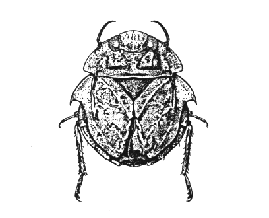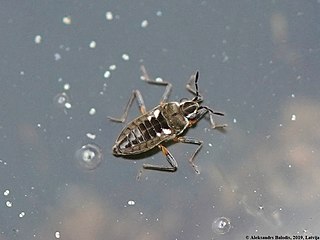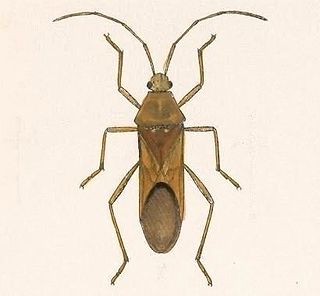
Nepidae is a family of exclusively aquatic Heteropteran insects in the order Hemiptera. They are commonly called water scorpions for their superficial resemblance to scorpions, due to their raptorial forelegs and the presence of a long slender process at the posterior end of the abdomen, resembling a tail. There are 14 genera in the family, in two subfamilies, Nepinae and Ranatrinae. Members of the genus Ranatra, the most widespread and species-rich genus, are sometimes called needle bugs or water stick insects as they are slenderer than Nepa.

Ranatra is a genus of slender predatory insects of the family Nepidae, known as water scorpions or water stick-insects. There are around 100 Ranatra species found in freshwater habitats around the world, both in warm and temperate regions, with the highest diversity in South America and Asia. Fewer are found elsewhere, but include several African, some in North America, three from Australia and three from the Palearctic, notably the relatively well-known European R. linearis. Since Ranatra belongs to the family Nepidae which in turn belongs to the order Hemiptera, ranatrids are considered "true bugs".

Priddy Mineries is a nature reserve previously run by the Somerset Wildlife Trust. It is in the village of Priddy, on the Mendip Hills in Somerset.
Distremocephalus is a genus of glowworm beetles in the family Phengodidae. There are about 11 described species in Distremocephalus.

Pnirontis is a genus of assassin bugs in the family Reduviidae. There are more than 30 described species in Pnirontis.

Ranatra kirkaldyi is a species of waterscorpion in the family Nepidae. It is found in North America.

Ambrysus is a genus of creeping water bugs in the family Naucoridae. There are more than 90 described species in Ambrysus.

Mozena is a genus of leaf-footed bugs in the family Coreidae. There are more than 30 described species in Mozena.

Microvelia buenoi is a species of smaller water strider in the family Veliidae. It is found in Europe & Northern Asia and North America.
Ranatra brevicollis is a species of waterscorpion in the family Nepidae. It is found in Central America and North America.
Mozena buenoi is a species of leaf-footed bug in the family Coreidae. It is found in Central America and North America.
Ranatra australis, the southern water scorpion, is a species of waterscorpion in the family Nepidae. It is found in North America.

Atractotomus magnicornis is a species of plant bug in the family Miridae. It is found in Europe and North America.
Gerris buenoi is a species of water strider that belongs to the family Gerridae. It was first identified in 1911 and is native to continental USA and Canada. Individuals of this species are small in size and have modified appendages, allowing them to float and "skate" along the surface of the water. G. buenoi can be found near the shoreline of freshwater ponds and small lakes, where they hunt for terrestrial insects that have fallen into the water.
Ranatra quadridentata is a species of waterscorpion in the family Nepidae. It is found in Central America and North America.

Savius is a genus of leaf-footed bugs in the family Coreidae. There are about nine described species in Savius.
Hebrus buenoi, or Bueno's velvet water bug, is a species of velvet water bug in the family Hebridae. It is found in Central America and North America.
Cercotmetus is a genus of water bugs in the subfamily Ranatrinae. The recorded distribution of this genus is from is from mainland Asia to New Guinea and northern Australia.
Ranatra montezuma is a species of waterscorpion in the family Nepidae. It is endemic to Montezuma Well in Yavapai County, Arizona, United States.









